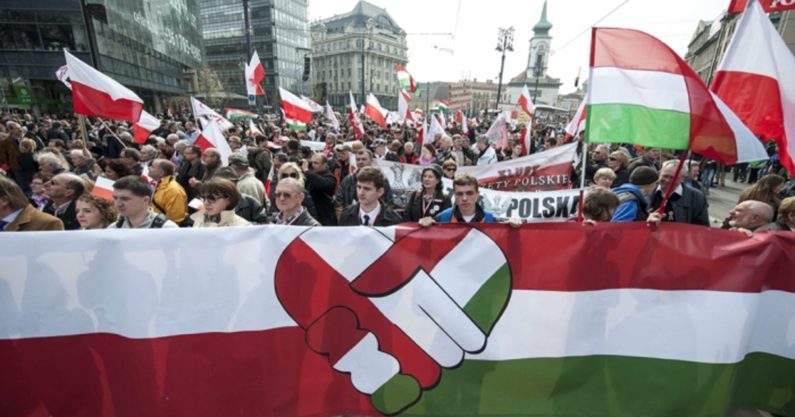The mythological foundation of the Hungarian-Polish friendship could be formed because from the meeting of the Czech, Polish and Hungarian kings in Visegrád in 1335 until 1989, we had common interests. But such clearing and settlement systems are fragile and short-lived, especially when the "creditor" party is permanently forced to experience that the other party not only does not repay, but on the contrary cynically and spectacularly unilaterally increases its debts, disregarding the elementary interests of the other party .
"England has no eternal friends, England has no eternal enemies, England has interests," said British Prime Minister Palmerston, referring in an unmistakable way to the fact that the so-called "friendships" of the puppets of the old, primitive and cynical farce called politics will last until raw interests coincide or at least can be coordinated.
As soon as this situation does not exist, the so-called "friendship" is immediately over. The false myth of the Polish wenger dva bratanki (Polish-Hungarian two good friends) only came about because, historically, during the last almost seven hundred years, our interests mostly coincided, or at least could be coordinated.
Never mind that, of course, long-term cooperation can help to develop a spiritual, moral and intellectual mutual attunement, which can help in cases where there is a conflict of interest, but the parties "anticipate" some trust in the framework of a kind of "moral clearing", expecting that in a similar case the other party will reciprocate it. But such clearing and settlement systems are fragile and short-lived, especially when the "creditor" party is permanently forced to experience that the other party not only does not repay, but on the contrary cynically and spectacularly unilaterally increases its debts, disregarding the elementary interests of the other party .
The mythological foundation of the Hungarian-Polish friendship could be formed because from the meeting of the Czech, Polish and Hungarian kings in Visegrad in 1335 until 1989,
when we were "live learners" together with the European community aid system of PHARE, since "P" stood for Poland and "H" stood for Hungary, we had common interests. Of course, both parties should have been a little more suspicious of the latter, because we were both victims of a lousy scam. This program mainly aimed at the brutal looting of Central and Eastern European countries under the guise of "regime change", and we assisted in this, as indicated by the letter "A" in the acronym-like abbreviation, in which the word phare means lighthouse. (This is also serious self-criticism, because the writer of these lines was the national coordinator of the PHARE aid program as the State Secretary of the Antall government from 1990. There is no excuse, only an explanation, and it is something of the kind that at that time it would have been an incomprehensible attempt to go against the arguments of the prevailing opinion. His death before, in 1993, József Antall had already told me the truth about the questions that he had forbidden even to raise in 1990.)
It is a historical fact that for centuries we really had common strategic interests with the Poles. First there around 1335, and then after the destruction of historical Hungary, a truly lasting alliance of interests was formed between the Transylvanian princes and the Polish ruling elites. While for us the pincers of the Habsburg and Ottoman Empires represented the death trap, for the Poles it was embodied by the German and Russian Empires. However, neither the Hungarian nor the Polish elites could understand that all this meant only versions of the same historical play performed on two nearby stages. That the Habsburg and Ottoman Empires were financed by the same financial power superstructure laughing cynically from the background, which financed Hitler and Stalin on a later stage.
Although it might have occurred to our Polish friends that three years pass between 1938 and 1941, and in addition to the three protagonists, i.e. the German and Russian Empires, which regularly lead each other, this certain world power that "doesn't exist" for many thousands of years is third, now for the sake of simplicity let's call it "West", so that this latter "character" turns the revolving stage three times as a real "game-changer".
First, in 1938, he made an alliance with the German (then "third") empire against the Russian Empire, which at that time was run as a prostitute under the cover name of the Soviet Union. Then, unexpectedly, the Germans and Russians ally themselves against this "non-existent" force. Well, that's all it takes, says the "non-existent", let's just mutually destroy each other. Grumbling a little, but obeying, the Germans attack the Russians nicely, but before they can completely destroy each other, the "non-existent" makes an alliance with the Russians against the Germans. In three years, the three-player game "only" turns three times, but Palmerston, on the other hand, is not turning in his grave, because he is satisfied that the "non-existent" force he also loyally serves has done a professional job. It is just icing on the cake that after the Germans and Russians have almost completely destroyed each other, obediently carrying out the orders of the "non-existent", the latter, as another stage turn, once again forms an alliance with the German Empire against the Russians.
Dear Polish friends, do you really not see any suspicious moments in this series of plays?
Have you really not noticed that this certain "non-existent" is making you stupid, just as it is now?
Do you really not see that, lured into the same historical trap, they throw you away with a cynical laugh as they did then? Swimming in a self-absorbed intoxication, do you seriously believe that now your two ancient enemies, the Russian and German empires, will finally collapse and you can finally create the thousand-year-old Great Poland from the Baltic to the Balkans, adding to it this "something" called Ukraine and the Romanians, who are always ready for anything? Well, you are fatally mistaken! And if they didn't notice, they paid a very high price for it.
Source: Magyar Hírlap
Photo: MTI













